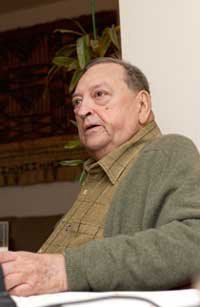
In its never-ending desire to educate the recalcitrant masses of Europe (that’s us, dear reader) the euro-elite has put together a new series of historical studies, entitled “The Making of Europe”. It is edited by the French mediaevalist Jacques Le-Goff.
In itself, there is nothing wrong with the idea or the title. After all, there have been numerous history books in the past, called “The Making of Europe”, “The Making of Modern Europe”, “The Making of Feudal Europe”, what you wish. This series, I suspect, is there to show that there has been a seamless “European” history from Rome to Rome. (Republic to Treaty).
It would seem that Greece comes into it somewhere because, as the great doyen of Russian and Soviet studies (and poet, and science-fiction writer, and political analyst), Robert Conquest, points out in today’s Wall Street Journal Europe [subscription only], there has been a row about one of the volumes.
This volume is about democracy and was written by an Italian professor of classical philology at Bari University, Luciano Canfora. In Italian the book was called La Democrazia: Storia Di Un’Ideologia. It has now been published in Italy, France, Spain and Britain. For some reason, the English edition has a somewhat different title: Democracy in Europe: A History.
Why Professor Canfora, who is described as “distinguished” but in the field of classical philology, should have been asked to write a book that is mostly about modern political history is something of a mystery. The mystery deepens when one takes note of the good professor’s political views.
A quick look at the summary and table of contents, provided by the publisher, Blackwell Publishing, leaves one slightly puzzled. For instance, the last two points of the brief summary are:
Considers fascism and its consequences for democracy in Europe during the twentieth century.
Demonstrates how in the recent past democracy itself has become the object of ideological battles.
 Um. Interesting. The book considers fascism and its consequences but not, apparently, communism. Perhaps that did not have consequences? Clearly, Professor Canfora does not think so.
Um. Interesting. The book considers fascism and its consequences but not, apparently, communism. Perhaps that did not have consequences? Clearly, Professor Canfora does not think so.
Chapter 9 of the volume is entitled From the slaughter of the Communards to the “sacred unions”. The Paris Commune and its immediate aftermath engulfed parts of France in a very nasty civil war. However, slaughter? A somewhat emotional and one-sided approach.
Moving on to other chapter headings we get the following:
Chapter 13 is entitled: Progressive democracies, people’s democracies, while chapter 14 is The cold war: democracy in retreat. Curiouser and curiouser, as Alice said. So, um, the people’s democracies a.k.a. Soviet colonies, are there in the history of democracy and the cold war was a retreat for democracy. Presumably, it was western victory in the cold war that was the actual retreat.
It appears from Mr Conquest’s article that the book is even more shocking than the brief summary and the table of contents might indicate. Indeed, so rampant is its Stalinophilia, that the German publisher, C. H. Beck refused to publish it and returned the rights to the author.
Needless to say, both Professor Canfora and Professor Le-Goff raised a fuss, accusing Herr Beck of exercising censorship, because a publisher, they insist must honour a contract. Neither of those statements is true. Publishers frequently go back on promises to publish when they actually read the text of the proposed book and censorship is not defined by one firm refusing to publish.
As it happens, Mr Conquest gives a lengthy analysis in his article of what censorship really is. He has to do so because there is no reference to the organization he mentions, Glavlit, in La Democrazia.
“As to the charge that the rejection of the is book amounts to censorship, it is a pity that the author did not cover the Soviet censorship machine – Glavlit – with some 70,000 employees (whose approval stamps appeared on almost everything printed in the USSR, even including bus tickets). Nothing in the least anti-Stalinist could be published. But even the rest had to be intensively checked.
As to books, after two “preliminary” checks, 28 pilot copies were sent to a number of ministries, including those of Defence and Security (MVD) – who also were sent three copies of “artistic, socio-political, children’s and instructional literature”.
After further inspection permission to print was given, with the first “obligatory copies” given to the MVD and the central Book Chamber of the RSFSR.
Several more steps preceded release to the public. And this could all be stopped at any point by Glavlit, which could seal and destroy the whole edition. There’s censorship for you! One feels that censorship as alleged in the Canfora case is a bit different.”
I’ll say it’s different. Glavlit, incidentally, also checked which books were taken out of the Soviet Union. The secret police under whichever nomenclatura dealt with the books that had been brought in.
Several of my childhood memories revolve round boxfuls of books that travelled with my family from Moscow to our home in Budapest. The books were carefully packed the evening before the journey. There was a list of them all in triplicate. One copy had gone to Glavlit for their approval, one had gone to the border gurards and one stayed with the books. Glavlit would have communicated with the border guards, who opened up the boxes and checked every single volume against their list, ensuring that nothing that had not been allowed was being taken out of the country.
I suspect there is nothing about this in Professor Canfora’s history. Professor Conquest wonders whether the chapter on the Cold War, described as democracy in retreat has
“such irrefutable material as, say, theatre’s “distinguished” Vsevolod Meyerhold’s account, from the NKVD prison, of his long tortures before execution”.
One suspects not, though the account (speaking again personally) is harrowing. I don’t suppose there is anything of the no less harrowing account of the appearance of Marshal Blücher after his prolonged torture before his execution.
Well, of course, there is nothing about it. There is nothing about the Gulag at all in the entire volume of the history of democracy, which spends a goodly number of words on attacking the USA “violently”
“for its support of “fascist regimes world-wide””.
Going on, Robert Conquest has this to say about the book’s coverage of recent history in the eastern part of Europe:
“Thus we learn, from Mr Canfora, of the negative role of Poland in failing to support Stalin. Katyn (like Gulag) does not figure in the index. We are treated to a Hungarian Revolution of 1956 in which the West is the main villain. And “hysterically anti-Soviet” opinion (particularly in Poland) is berated. (A useful guide to Stalinophilia is the use of “hysterical”, “frenzied” and “rabid” to describe non-communists.)”
We are all used to the double standard of the clever-dick great and the good (most of whom just happen to be Europhile) that demands prison for anyone who raises the slightest criticism of the accepted view of the Holocaust and shrugs metaphorical shoulders if not disappears in total embarrassment when Communist crimes are discussed.
David Irving is not only in Austrian prison but is, rightly, beyond the pale as far as serious history is concerned. Luciano Canfora who is no less guilty of peddling lies and is probably more consistent in his support for a murderous regime, has his book published in several languages as part of the more or less official history of the making of Europe.
What I find particularly depressing that while in Germany the book has been rejected with numerous writers, including the left wing historian Hans Ulrich Wehler, publicly supporting Herr Beck’s decision; while the Neue Zürische Zeitung published an article by Joachim Güntner, which agreed with Beck’s chief editor Detlef Felken that Canfora is “palliating communism”; not a word has been spoken in Britain.
Blackwell’s has happily published the English version and there has been no controversy. Why not, precisely? Why cannot a left-wing (or right-wing, for that matter) historian say as Herr Wehler did?
“In its dogmatic stupidity he [Canfora] exceeds the products of the GDR in the sixties and seventies.”
Of course, let us not forget, Professor Eric Hobsbawm, whose analysis of twentieth century history is not that different from Professor Canfora’s, is now Companion of Honour and a much celebrated “left-wing” historian, whose tendentious and inaccurate volumes are required reading in most universities. Canfora’s history of “democracy” will sit well on those reading lists.
COMMENT THREAD
No comments:
Post a Comment
Note: only a member of this blog may post a comment.